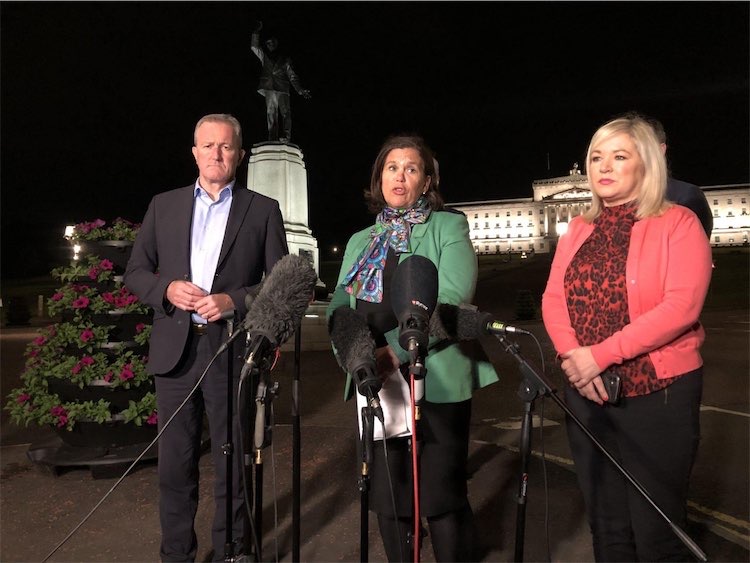DUP And Sinn Fein Strike Agreement On Irish Language To Prevent Stormont Collapse
4 min read
Northern Ireland's Executive has avoided falling apart again after the Democratic Unionist Party and Sinn Fein reached an agreement on Irish language legislation late last night.
Sinn Fein agreed to nominate the DUP's Paul Givan to replace Arlene Foster as the First Minister after hours of emergency talks in Belfast with Brandon Lewis, the secretary of state for Northern Ireland.
The nomination was confirmed in the Northern Irish Assembly at Thursday lunchtime, with Sinn Fein's Michelle O'Neill also receiving approval to continue as Deputy First Minister.
Northern Ireland was hurtling towards another political crisis on Wednesday with Sinn Fein refusing to nominate Givan over a row about long-awaited Irish language legislation.
Sinn Fein and other political parties in Stormont said the DUP was abandoning a previous commitment to give the Irish language equal status to English before the next set of elections in Northern Ireland.
The legislation was part of the 'New Decade, New Approach' package which Northern Ireland's political parties supported in order to get Stormont back up-and-running in January 2020 after it collapsed nearly three years earlier.
Prime Minister Boris Johnson piled pressure on the DUP on Wednesday afternoon to reach an agreement with Sinn Fein and the UK government, telling MPs that the "whole" of the 'New Decade, New Approach' package had to be implemented by Stormont.
Lewis, who in an interview with PoliticsHome this week said the Northern Irish public would not tolerate its political parties failing to work together, helped broker the deal by confirming the UK government would implement the legislation in Westminster if Stormont hadn't done so by the end of September.
In a statement in the early hours of this morning, Lewis said he was "disappointed" the Stormont executive had not yet delivered the Irish language legislation.
He added: "However, following my intensive negotiations with the parties over the last few days, I can confirm that if the executive has not progressed legislation by the end of September, the UK government will take the legislation through Parliament in Westminster.
"If that becomes necessary, we will introduce legislation in October 2021".
DUP leader Edwin Poots' decision to make an agreement with Sinn Fein triggered a mutiny in his own party, however, with the 24 of the party's 28 MLAs opposing the deal in a private vote.
Poots is only a month into the job after being elected to replace Foster in May. 
Sinn Fein President Mary Lou McDonald said the agreement to enshrine equal status for Irish language in law was "important for Irish language speakers and for wider society because power-sharing is based on inclusion, respect and equality".
The Republic of Ireland's Taoiseach Micheál Martin also welcomed news of the breakthrough in Belfast.
"I look forward to working closely with the first minister and deputy first minister," he said.
"We share significant challenges ahead to build economic and societal recovery as we emerge from the Covid-19 pandemic. There is much we can do together in terms of practical cooperation for the benefit of people across this island".
Jon Tonge, British and Irish politics professor at the University of Liverpool, said the prospect of an early election in Northern Ireland in the event of Stormont collapsing meant the DUP "really had no choice" but to sign up to the agreement, with the party languishing in the opinion polls.
"The DUP knew what was coming. They knew it was inevitable," he told PoliticsHome.
"The party knew Sinn Fein was going to demand Irish language leiglsation. It was always going to be the price of getting rid of Arlene Foster," he told PoliticsHome.
He said that while the agreement on Wednesday night a was significant breakthrough, there could be "problems" for Stormont later in the year when the DUP and Sinn Fein are tasked with agreeing on commissioners to lead on language and culture.
"It is the responsibility of the First Minister and Deputy First Minister combined to appoint an Irish language commissioner and a commissioner for the Ulster-Scots/Ulster-British tradition," he said.
"You are looking at a scenario whereby First Minister Paul Given has to listen to enthusiastic plans for provision of Irish language, appoint a commissioner, and get it cleared with his DUP colleagues.
"Not many people think that will go seamlessly.
"And it's the same with Michelle O'Neill and the Ulster-Scots/Ulster-British commissioner".
